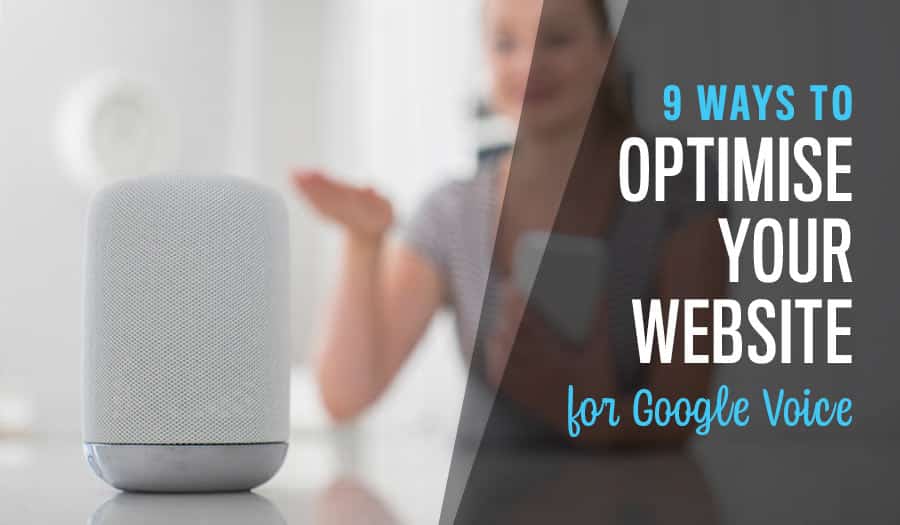Voice search is quickly gaining traction. Optimising your site for Google voice search is crucial if you want the edge over your competition. Google voice search is changing how we search for the answers to our queries, how we look for information and, importantly, how Google manage search queries. Let’s explore 9 Ways to Optimise your Website for Voice Search.
9 ways to optimise your website for voice search
- Keep it simple
- Ask the right questions
- Aim for easy-to-read content
- Keep your content long-form
- What’s Your Page Speed
- HTTPS and SSL
- Social Sharing
- Authoritative Domains
- Select Keywords & Google My Business
Voice search is here to stay, with well over 30 million voice-first devices in operation, 20% of queries on Google are now coming from voice searches, with 40% of adults performing a voice search once per day. Voice search is gaining ground, which can be good news for your business if you choose to understand the power of voice search and optimise your content for it now.
Modifying your SEO strategy to include voice optimisation has the potential for huge dividends. In addition, ensuring your content is optimised for voice today will likely place you well ahead of your competition and future-proof your SEO.
How voice search works & how voice search will impact your business
We can now communicate with our devices, from our phones and wearable devices to smart speakers. Amazon’s Alexa, Apple’s Siri, Microsoft’s Cortana and Google Home are just a few ways people conduct voice searches for the information they need.
Google voice searches are not just limited to Google Home, they can also be performed through spoken voice commands using a desktop or mobile. In addition, Google Now, Google’s virtual assistant, is currently considerably more accurate than its rivals. Google’s natural language processing (NLP) technology and powerful search algorithms make it a formidable competitor.
When Google Home answers your voice query using information from the internet, you will hear Google Home say the website’s name from which it sourced the data, and the link to that website will often be sent to your Google Home app.
At present, Google Home and Google Assistant source their information from featured snippets – this has naturally increased people wanting to optimise their websites for featured snippets. (Hopefully, your site is currently utilising best practice SEO. If you’re already baffled, you can learn more about featured snippets here).
In a nutshell, Google featured snippets, and Google voice search currently go hand in hand. Let me explain briefly how it all works so that you can use it to your advantage:
Ok Google, what is a Google featured snippet?
Featured snippets hold the coveted position zero in search results. They often appear as a highlighted paragraph of up to about 50 words, sitting above the search results in position zero, providing a short, concise and direct answer to a search query.
Securing position zero means your website content has provided the best answer to a search query on a given topic. Your website must appear in the first page of the search results on the given topic – but does not need to be ranked at #1 for the content to be selected to appear in a featured snippet.
Having your content appear in a Google featured snippet is one way your business can build online credibility and hopefully drive increased traffic to your site.
Why is appearing in a featured snippet so crucial for voice search?
In a voice search, the answer provided generally comes from the Google featured snippet. Backlinko conducted a study in which they discovered 40.7% of all voice search answers were sourced from a featured snippet. So, if you want to appear in a Google Home voice search, it is time to chase and secure that coveted Google featured snippet.
9 ways to optimise your website for voice search
1. Keep it simple
People using voice search usually after specific information; they expect their query to be answered in a few short sentences, and they expect the answer instantly. This is why Google has shown a preference to quick, concise voice search answers. Optimising your content to appear in Google featured snippets will pave the way to emerging as the authoritative answer in a Google voice search, but to truly optimise for voice search, ensure your answers are as short and as concise as possible. Generally, a selected voice search answer sits around just 29 words in length, as opposed to the 50-word average of an answer appearing in a Google featured snippet.
2. Ask the right questions
Consider the questions your customers might want answers to (such as your opening hours and street address), and ensure these answers are easily obtained on your site. Next, think of your products and/or services and the questions customers typically ask. Keep this in mind while structuring your site and your content.
3. Aim for easy-to-read content
According to Backlinko, “the average Google voice search result is written at a 9th grade level”, therefore, aim for linguistic simplicity.
4. Keep your content long-form
Google are inclined to source answers from long-form content, with the average word count of a voice search result sitting at the 2,312 word mark.
5. What’s Your Page Speed
The average voice search result page loads 25% faster than the average page, loading in around 4.6 seconds. Page speed seems to be a sizeable factor in voice search SEO. If you want to rank in voice search, we recommend you ensure your site loads as quickly as possible. PageSpeed is thought to be a key ranking signal in the Google voice search algorithm, as suggested by these figures.
6. HTTPS and SSL
A whopping 70.4% of Google Home voice search results pages are secured with HTTPS, according to the Backlinko study. However, there is debate and a marked difference of opinion as to whether or not this is a ranking signal for voice search.
7. Social Sharing
With an average 44 Tweets and 1,199 Facebook shares, the average voice search result certainly has a high level of social engagement. Sharing relevant content is a business no-brainer, and when it comes to voice search SEO, it just became a win-win. After all, the content you share will be seen by the audience you choose to share it with – plus, it might also help your content feature in voice search results.
8. Authoritative Domains
Authoritative domains have been proven to win out over non-authoritative domains in voice search results.
9. Select Keywords & Google My Business
With 22% of voice searches asking for an answer that includes “near me”, and Google’s revelation that “near me” searches have grown more than 130% YoY, it is imperative Google is able to determine your location. Firstly, you can incorporate words and phrases people may use to describe your location in your SEO strategy. You can use your FAQ section to add information detailing your location, such as proximity to any landmarks or local institutions that may be relevant.(For example, if your business is in Dee Why, you should try incorporating the words “Northern Beaches”).
A search for the phrase “near me” will likely pull up listings from online directories, such as Google My Business. It is essential to claim your business on Google My Business (to discover what Google My Business is and how it benefits you, click here or to find out how to set up Google My Business). You should also check other online directories, such as Bing Places for Business, to confirm your name, address, and phone number are correct.
Before the arrival of Google featured snippets and voice search, website owners and marketers were guilty of writing content to rank higher in search engine results. Google have shifted their focus toward valuable content that answers user queries. This will result in helpful, informative content focused on the user’s needs being given the prime real estate of position zero and likely featuring in answers to voice search queries.
We can be thankful that the days of stuffing content with keywords that users found irrelevant are gone. It is now more critical than ever for businesses to be mindful that they deliver useful, concise and instructive content written with the end user in mind if they want to come out on top in search results.
If you want to learn more about how to optimise your website and future-proof your SEO, contact us.
Let Sydney’s leading Web Design Agency take your business to the next level with a Pixel Fish Small Business Website.
Check out some of our latest Website Design projects and Testimonials.
Further Information
Understanding Inclusive Web Design & How to Include It in Your Website
How to Create a Saleable Business Using Your Website
10 Top Tips to Collect More Donations Online For Your Non-profit
Top 5 Learning Management WordPress Plugins
How to Successfully Market Your Business Post COVID-19
Top 5 Online Learning Platforms to Help You Grow as a Business Leader



